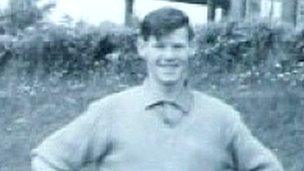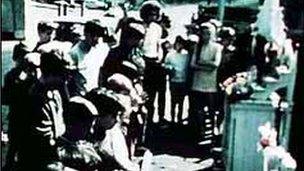Eamonn McDevitt: papers 'prove man shot by Army was unarmed'
- Published

Eamonn McDevitt was shot dead by the Army in 1971
The family of a County Tyrone man who was shot dead by the Army 42 years ago say they have documents that prove he was unarmed when he died.
Eamonn McDevitt, 28, who was deaf and could not speak, was killed at Fountain Street, Strabane, following an anti-internment march on 18 August 1971.
At the time, the Army claimed he was waving a gun when he was shot.
But people who were at the scene said he was waving his hands about - his way of attracting attention.
The McDevitt family have fought a campaign to establish his innocence.
The documents they have in their possession now, were uncovered with the help of the Pat Finucane Centre - a human rights organisations that investigates controversial killings in the Northern Ireland Troubles.
Eamonn McDevitt, external's brother Sammy said the family never got over his death and they have called for an apology.
"I feel that we have been let down. We have been lied to all down the years," he said.
Mr McDevitt said that after Eamonn's death, the family was never the same.
"There never was that real happiness that we had," he said.
"When they shot my brother, they may as well have killed my father and mother. It was devastating," he said.
"He was labelled as a gunman. People that you knew didn't know what way to think. You didn't feel right. You felt you couldn't keep your head up."
Mr McDevitt said the document proved his brother was not a gunman.
"I would just like a verbal and written apology for what the Army did. At this stage, I am not seeking a prosecution," he said.
"We could not get the documents for more than 30 years. They were locked away. This document has proved our point in no uncertain terms. It shows my brother was not a gunman. It has proved us right all down the years. They knew, there was nothing, no forensics, no nothing and we are happy that the document shows this."

The scene of Eamonn McDevitt's shooting at Fountain Street, Strabane
Paul O'Connor from the Pat Finucane Centre said the document was uncovered in the Ministry of Defence's national archives at Kew in England.
He said that the paper showed that the Army, crown counsel and the MoD, were all of the opinion that the overwhelming evidence from civilian witnesses was that Eamonn McDevitt had nothing in his hands when he was shot by a soldier from the Royal Marines.
Mr O'Connor said the Historical Enquiries Team (HET) had been investigating the shooting, but it has since been suspended.
"I think that the document is conclusive," he said.
"After the shooting, a civilian witness heard a senior Army officer shouting: 'Who gave the order to shoot?'
"At the inquest, the coroner found Eamonn McDevitt was not armed at the time he was shot."
Mr O'Connor said what was so galling for the family was the Army's contention that he was armed was "left in the air".
He said the onus should not be on families to instigate extensive research to establish the truth of what happened to their loved ones.
A spokesperson for the Ministry of Defence said no comment could be made until they had seen the documents.